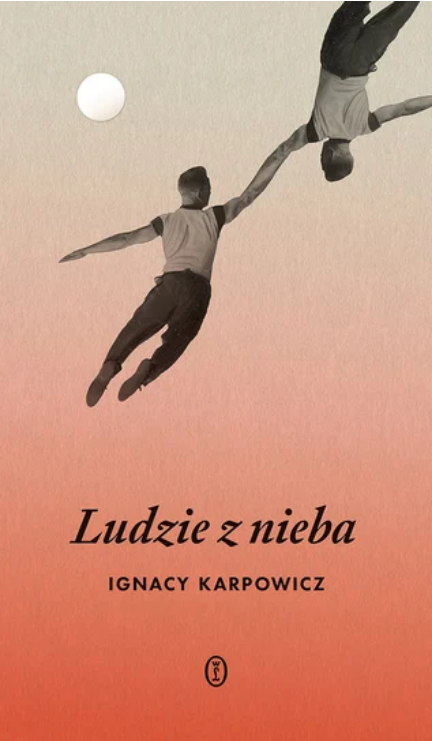
Chwała i upadek. Miłość i śmierć Nowa powieść Ignacego Karpowicza inspirowana historią życia legendarnych lotników: pilota Franciszka Żwirki i inżyniera Stanisława Wigury. Rok 1905. Kora spędza dzieciństwo w Bieniakoniach, miasteczku na południe od Wilna. Ma brata bliźniaka i sześć sióstr: Hiacyntę, Kalinę, Różę, Dalię, Rutę i Hortensję. Jako jedyna z dziewczyn nie otrzymała imienia od nazwy kwiatu. Chodzi do tyłu jak rak, bywa psem, rozmyśla nad milionem pozornie błahych spraw. Marzy o innym świecie, tęskni za przygodą, księciem i za bratem Franciszkiem, który wyjechał do szkół, by zostać kiedyś najsłynniejszym polskim pilotem. Pewnego dnia Cyganka przepowiada jej niepokojącą przyszłość… Gdy dziesięć lat później przez miasteczko przechodzą bieżeńcy, świat, który znała Kora, nagle przestaje istnieć… Karpowicz w Ludziach z nieba narusza filary tradycyjnie pojmowanej tożsamości, przekracza granice czasu i wyobraźni oraz przypomina, że najważniejsze, co nam się w życiu przytrafia, to relacje z drugim człowiekiem.
Author

Born 1976, prose-writer, traveler, translator; he made his debut with the novel Uncool (2006), and then published another novel, The Miracle (2007), and a collection of impressions from his journeys around Ethiopia, The Emperor’s New Flower (and Bees) (2007); which was nominated for the POLITYKA Passport; he lives (mainly) in Warsaw. The first part of Ignacy Karpowicz’s debut novel, Uncool, might seem to suggest that we have here another young prose-writer seeking to describe the various miseries of the provincial life, as the author brings us young and frustrated residents of Białystok who have difficulty making ends meet. But the second part of the novel clearly leans toward unhinged, no-holds-barred grotesque, in which the writer opens the floodgates of fantasy (the main protagonist speaks with animated monuments, the city becomes a battleground for various fractions, wallowing in total chaos). In his next novel, The Miracle, Karpowicz has clearly set his money down on the grotesque. The book’s protagonist dies in a car accident, but his body does not decay after death, on the contrary – it maintains a high temperature. The appearance of this unusual corpse throws the lives of the people who encounter it into confusion, and forces them to reevaluate their views on the world. Karpowicz is a refined stylist, who skillfully uses the grotesque, irony and humor (unconventional, disarming, often black) to tackle stereotypical ways of thinking about reality. He makes light of patriotic and religious cliches in an intelligent and refined manner. But Karpowicz is no ordinary provocateur – this mockery is what allows him to gain some distance from the world. In The Emperor’s New Flower Karpowicz tackles reportage. He describes his travels through Ethiopia, giving us some insight into the history, culture and daily life of this exotic country. The author also tries to deconstruct the traditional model of reportage in his book, consciously bending genres, being neither reportage nor novel, but rather a unique sort of travel prose, thus stressing what he sees as the irreducible subjectivity of his descriptions of the country he encounters.